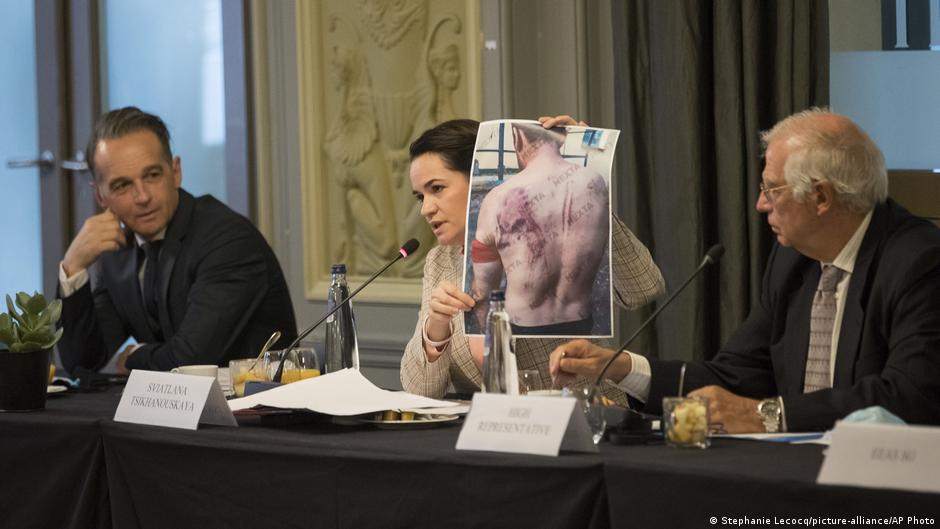Cyprus blocks EU sanctions against Belarus

Lithuania and Latvia and top EU chief Josep Borrel condemned the move. Belarusian opposition leader Sviatlana Tsikanouskaya also failed to sway the island nation, despite meeting top EU officials at breakfast.
Cyprus vetoed attempts by EU foreign ministers to impose sanctions against some 40 Belarusian officials, including Alexander Lukashenko.
The measures were being considered in response to the election that saw Lukashenko elected to a sixth term in office, and the Minsk government's tough response to protesters who dispute the result.
Cyprus, which has good relations with the Lukashenko-supporting Russian government, had wanted the sanctions to be tied to sanctions against Turkey due to a dispute over gas drilling in the eastern Mediterranean.
Read more: Belarus police detain hundreds at women's rally against Lukashenko's rule
'Lamentable'
Baltic neighbors Lithuania, which is hosting Belarus' exiled opposition leader Sviatlana Tsikanouskaya, and Latvia expressed disappointment at Cyprus' veto.
Foreign Minister Linas Linkevicius told DW: "This is definitely lamentable ... I hope it will be solved but nevertheless it’s definitely disappointing." A unanimous EU agreement on sanctions against Belarus would not stop Lithuania from helping the Belarusian people, added Linkevicius.
Following the meeting, he tweeted: "Today's failure to agree on sanctions in support of Belarusians, suffering & fighting for democracy, undermine credibility of democratic values they are fighting for."
Latvian Foreign Minister Edgars Rinkevics tweeted that it "sends a wrong signal to Belarusians, our societies and the whole world"
"Although there is a clear will to adopt those sanctions, it has not been possible to do that today because the required unanimity was not reached,'' EU foreign policy chief Josep Borrell told reporters after chairing the ministers' meeting.
"Cyprus is missing to give us unanimity."
What the Belarus opposition said
The ministers opened the debate after meeting Tsikanouskaya, who called for a courageous response.
Speaking to reporters after meeting the ministers at breakfast, Tsikhanouskaya urged Europe to cut any financial support to the Belarus government.
"We did a lot to manage with this situation by ourselves, with only the strength of the Belarusian people, but now I understand that we need exterior help," she said, speaking in English.
Tsikhanouskaya said she understood that some ministers were reluctant, but that financial help would "only go for violence, for killing Belarusian people."
"At this meeting, I asked just to be more brave," she had said.
What is the situation in Belarus?
The August election result showed Tsikanouskaya winning only about 10% of the vote, with Lukashenko — who has been in power for the past 26 years — garnering about 80%. Several people have died in protests since the vote.
Read more: Maria Kolesnikova: Belarusian musician, Lukashenko opponent
Tsikanouskaya was forced to flee Belarus for her own safety after the election.
A history of sanctions
EU foreign ministers unanimously agreed to lift restrictions in 2016, citing progress in improving the rule of law in Belarus. Sanctions had previously targeted several arms companies with close ties to the government and froze the assets of and implemented travel bans on 170 people.
EU nations would need to unanimously approve each individual or organization on it before new sanctions can go into effect.
tinyurlis.gdu.nuclck.ruulvis.netshrtco.de
